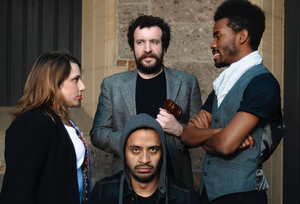Review: THE LAST DAYS OF JUDAS ISCARIOT Asks the Question: WWJD?

The Last Days of Judas Iscariot
Written by Stephen Adly Guirgis, Directed by Steven Bogart; Lauren Elias, Producer; Alex Roy, Assistant Director/Dramaturg; Allison Davis, Stage Manager; Kelsey Whipple, Assistant Stage Manager; Kathryn Long, Production Manager; Justin Lahue, Set Designer; Chris Bocchiaro, Lighting Designer; Amanda Hackney, Assistant Lighting Designer; Lee Schuna, Sound Designer; Chelsea Kerl, Costume Designer; Cesara Walters, Props Designer; Charles Linshaw, Dialect Coach; Matthew Dray, Fight Choreographer
CAST (in autobiographical order): Liz Adams, Blyss Cleveland, Matthew Dray, Lauren Elias, Jamie Hernandez, Rory Lambert-Wright, Cristian Mancinas-Garcia, Enosa Ogbeide, Robert Orzalli, Maurice Palmer, Dan Prior, Victor Shopov, Felton Sparks, Jon Vellante, Arthur Waldstein
Performances through November 23 by Hub Theatre Company at First Church in Boston, 66 Marlborough Street, Boston, MA; All tickets for all shows are PAY-WHAT-YOU-CAN at www.hubtheatreboston.org
Hub Theatre Company of Boston concludes its seventh season with an ambitious undertaking, the time-bending, courtroom dramatic comedy, The Last Days of Judas Iscariot, by Pulitzer Prize winning and Tony Award nominated playwright Stephen Adly Guirgis. Boston audiences will recognize his name from two acclaimed productions at SpeakEasy Stage Company in recent years, The Motherfucker With the Hat and Between Riverside and Crazy. First staged Off-Broadway at The Public Theater in 2005, The Last Days is set in Hope, a corner of Purgatory, where a trial is being held to determine Judas' fate: should he ascend to Heaven, or remain in Hell for his crime of betraying Jesus?
Director Steven Bogart counts among his blessings the venue - the sanctuary of the First Church in Boston - and an ensemble cast of fifteen actors who miraculously cover a total of 27 roles. Cristian Mancinas-Garcia (Judas) does justice to the title character, alternately slogging through long stretches of catatonia, overcome with guilt and self-loathing, and bursting out with righteous indignation. There is little he can do but wait as his defense attorney Fabiana Aziza Cunningham (Lauren Elias) and the prosecutor Yusef Al-Fayoumy (Maurice Palmer) match wits in Judge Littlefield's (Robert Orzalli) courtroom.
An interesting array of witnesses gives testimony, including several of Jesus' followers, Pontius Pilate (Rory Lambert-Wright), Mother Teresa (Arthur Waldstein, very funny interpretation), Sigmund Freud (also Waldstein), and Satan (Victor Shopov, born to the role). Each has a different perspective on what transpired, whether or not Judas was justified in turning on Jesus, and some alleging that Jesus also betrayed his flock. There is a jury that sits in judgment, but it seems clear that the playwright's intention is for the audience to also make their own determination. From my perspective, knowledge of Christian scripture would help to keep the players straight without a scorecard and to fully appreciate the nuances of the proceedings. Even without a primer on the New Testament, and bearing in mind the two-act play runs approximately three hours (with one intermission), Bogart and company put forth an engaging production.
The architecture and ambience of the sanctuary provide a sense of gravitas and spirituality which is heightened by Chris Bocchiaro's lighting design. Chelsea Kerl's costumes range from present-day professional attire worn by the attorneys, to an iridescent crimson-hued suit and red shoes for Satan, to religious garb for Mother Teresa and Sister Glenna, to hoodies and punk stylings. Set design is by Justin Lahue, Lee Schuna is the sound designer, and Cesara Walters is the props designer. Enhanced by the gestalt of the design elements, Guirgis' modern day language and street vernacular evoke a bipolar effect, an ancient historical transgression framed by the standards of contemporary justice, pushing the boundaries of faith to find the seeds of forgiveness.
Photo credit: Tim Gurczak (Lauren Elias, Robert Orzalli, Cristian Mancinas-Garcia, Maurice Palmer)
Add Your Comment
Videos
